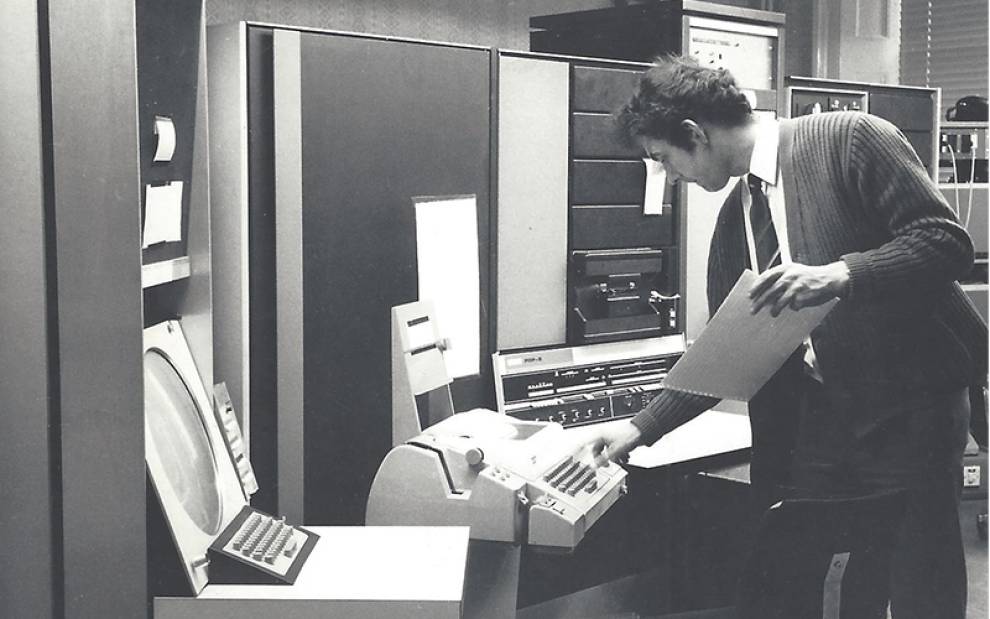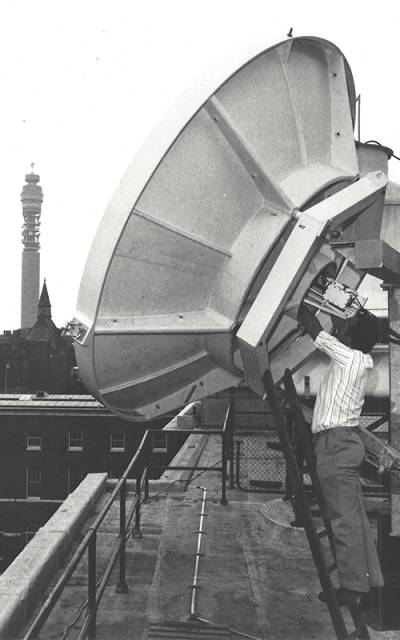Recollections of the Early Days of Arpanet at UCL by Professor Steve Wilbur.

Imagine (or remember) a world without the computing and networking facilities that we take for granted today. No social media, no cloud, no Zoom, no web, no word processing or PCs, and no Internet.
Main memory was measured in kilobytes, one-millionth of today’s systems! This was the scene in the early 1970s when Sylvia Kenney and I were Research Assistants in Peter Kirstein’s INDRA research group.
Computing then was largely done using large mainframes fed by programs and data on punched cards, paper tape or magnetic tape. Timesharing machines existed, accessed by teletype and modem connections at 110 bits per second and the group had a “high-speed” point-to-point connection to the Rutherford Appleton Laboratories at 1200 or 2400 bits per second.
The group also had a PDP-9 minicomputer which occupied most of a room in 47 Gordon Square. You needed to book the machine for an hour or more at a time because even editing a program meant a wait of several minutes while tapes wound back and forth.
Meanwhile, in the USA they had built a network of computers for academic and government research, partly aimed at resource sharing and researching computing migration in the case of a nuclear attack.
This Arpanet could have a maximum of 64 nodes, one of them being a seismic sensing station in Norway connected via satellite. After the original plans to locate another node at the National Physical Laboratory in the UK changed, the node was installed with Peter Kirstein’s UCL group connected to the Norway node.
A Terminal Interface Message Processor (TIP) minicomputer was installed alongside the INDRA group’s PDP-9 in 47 Gordon Square. (see top image).
In September 1973, Doug Engelbart of Stanford Research Institute gave a mind-blowing talk and demonstration in Gordon Square. This was at a time when mechanical teletypes were the norm.
To see an early screen user interface on a character-based VDU with screen areas (windows) for different running tasks controlled by a prototype mouse and 5-key chord device was amazing. Little did we know! (Unlike the now ubiquitous mouse, the chord device did not find favour.)
On a high from this demonstration, Sylvia and I found a teletype and logged in to a time-sharing machine in California via the recently commissioned TIP. Today, it seems silly that we were so excited by this act, but we verified that the Californian machine’s time was 8 hours behind ours!
The TIP allowed researchers in UK universities to access machines in the US and forge stronger research collaborations. During these early days, support was needed for academics in participating UK universities and Sylvia was the liaison person.
Simple messaging between users on the same timesharing machine was available, but email addressing, protocols and mail reading applications as we know them, were in their very early stages (first implemented in the US in 1972).
In a 2005 interview, Sylvia said about email “… It was one of the first things we started to do. I was probably one of the first people in this country ever to send an email, back in [1973]. And that was really thrilling. You could see the potential! Yes. It was amazing, yes.” There was also a “chat” application and I spent many late nights and early morning hours collaborating with Doug Engelbart’s group at SRI on graphics and email applications.

The PDP-9 had a direct connection to the TIP which was used to implement and test the newly designed Transmission Control Protocol (TCP) to allow expansion beyond its original 64-node addressing and enabling the Internet we know today.
We were one of just three groups contracted to do this (Stanford University, the Bolt, Beranek and Newman company, and UCL). For this, the UCL team earned a place on the Birth of the Internet plaque at Stanford University in 2005.
The events of that day in September 1973 changed my life, as Sylvia and I got married in 1976 and spent 45 happy years together! Her career took her eventually to QMW where she worked on Computer Supported Collaboration and was a passionate Women in Computing activist.
I continued working in networking and distributed computing with the Cambridge Ring LAN, satellite networking, and distributed multimedia systems.
UCL Computer Science would like to thank Professor Steve Wilbur (former Head of Department) for his reflections on this special occasion. Written in October 2023.
 Close
Close

